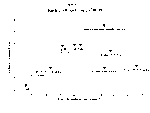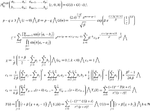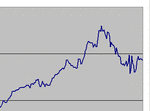Yamato
Legendary member
- Messages
- 9,840
- Likes
- 246
efficient frontier
Today I moved on to the "efficient frontier", because I found a chart of it on the second chapter of Bernstein's intelligent asset allocator book:
CHAPTER TWO

But then you go on wikipedia and read the word "hyperbola", which is not the same as "hyperbole":
Efficient Frontier - Wikipedia, the free encyclopedia
And I could not let it rest, but had to find out what it is:
Hyperbola - Wikipedia, the free encyclopedia
But then... it looks like a parabola:
So I had to search more and found this:
Difference Between Parabola and Hyperbola | Difference Between
But it wasn't enough and... major sidetracking. I could not let this ignorance be, and I went on download.com and downloaded a graphing calculator to delve deeper into the matter:
Graph - Free software downloads and software reviews - CNET Download.com
And this is excellent, but... major sidetracking. Not procrastination, but sidetracking. That's the mother ****er, who blamed me and called me "lazy" and similar, too many times in my life. Ever since then, if there's a question mark anywhere, I have to prove that I am not lazy. I cannot leave any questions unanswered nor any problems unsolved.
That's how he succeeded in making me a compulsive mother ****er. That's why I have 332 friends and counting. I'll "befriend" anything that moves. I can't stop befriending, I can't stop searching, I can't stop wondering, I can't stop posting, I can't stop. That word "lazy" echoes in my mind, and makes me a compulsive worker, which is counter-productive. His relentless criticism still echoes in my head, in my subconscious, decades later, and I fight it off by working harder and harder, and... it has to stop. I can't keep going like this. I am not focused on one thing, on what I should be focusing.
If I keep trying on doing everything, on being a writer, a singer, a moviemaker, a collector, a trader, a mathematician... I'll fail at everything. I need to focus on math now, figure out the portfolio theory, trade again, quit my job, and only then move on to other subjects. This compulsive work has not lead to anything yet. It's got to stop before it's too late.
And I have to stop posting on my journal every single thought I have and stop documenting every single step forward I make. I can skip some steps. I'll have to, or this will take forever. This reasoning out loud here. But it was useful when I was getting started on math again. I wouldn't have done it otherwise. I'll come back in case I get stuck on something again.
Today I moved on to the "efficient frontier", because I found a chart of it on the second chapter of Bernstein's intelligent asset allocator book:
CHAPTER TWO

But then you go on wikipedia and read the word "hyperbola", which is not the same as "hyperbole":
Efficient Frontier - Wikipedia, the free encyclopedia
And I could not let it rest, but had to find out what it is:
Hyperbola - Wikipedia, the free encyclopedia
But then... it looks like a parabola:
The word "hyperbola" derives from the Greek ὑπερβολή, meaning "over-thrown" or "excessive", from which the English term hyperbole also derives. The term hyperbola is believed to have been coined by Apollonius of Perga (ca. 262 BC–ca. 190 BC) in his definitive work on the conic sections, the Conics. For comparison, the other two general conic sections, the ellipse and the parabola, derive from the corresponding Greek words for "deficient" and "comparable"; these terms may refer to the eccentricity of these curves, which is greater than one (hyperbola), less than one (ellipse) and exactly one (parabola), respectively.
So I had to search more and found this:
Difference Between Parabola and Hyperbola | Difference Between
But it wasn't enough and... major sidetracking. I could not let this ignorance be, and I went on download.com and downloaded a graphing calculator to delve deeper into the matter:
Graph - Free software downloads and software reviews - CNET Download.com
And this is excellent, but... major sidetracking. Not procrastination, but sidetracking. That's the mother ****er, who blamed me and called me "lazy" and similar, too many times in my life. Ever since then, if there's a question mark anywhere, I have to prove that I am not lazy. I cannot leave any questions unanswered nor any problems unsolved.
As we go down life's lonesome highway,
Seems the hardest thing to do
Is to find a friend or two
That helping hand,
Someone who understands,
When you feel you lost your way,
You've got someone there to say:
I'll show you
That's how he succeeded in making me a compulsive mother ****er. That's why I have 332 friends and counting. I'll "befriend" anything that moves. I can't stop befriending, I can't stop searching, I can't stop wondering, I can't stop posting, I can't stop. That word "lazy" echoes in my mind, and makes me a compulsive worker, which is counter-productive. His relentless criticism still echoes in my head, in my subconscious, decades later, and I fight it off by working harder and harder, and... it has to stop. I can't keep going like this. I am not focused on one thing, on what I should be focusing.
If I keep trying on doing everything, on being a writer, a singer, a moviemaker, a collector, a trader, a mathematician... I'll fail at everything. I need to focus on math now, figure out the portfolio theory, trade again, quit my job, and only then move on to other subjects. This compulsive work has not lead to anything yet. It's got to stop before it's too late.
And I have to stop posting on my journal every single thought I have and stop documenting every single step forward I make. I can skip some steps. I'll have to, or this will take forever. This reasoning out loud here. But it was useful when I was getting started on math again. I wouldn't have done it otherwise. I'll come back in case I get stuck on something again.
Last edited:



